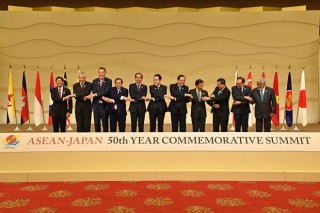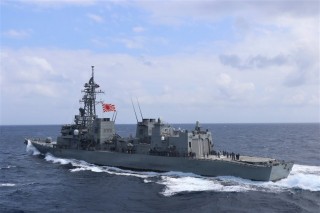Loading
Search
▼ Japan, ASEAN Step Up Security Cooperation Amid South China Sea Tensions
- Category:Other
Japan and Southeast Asian nations have agreed to “promote a rules-based Indo-Pacific region that is free and open” amid China’s growing assertiveness.
Tokyo and the ASEAN bloc have held special summit over the past two days to celebrate 50 years of friendship and bilateral cooperation. A significant part of the Joint Vision Statement and its implementation plan released during the event is dedicated to cooperation in maritime security.
“We reaffirm our commitment to uphold international law, including the UN Charter and the 1982 United Nations Convention on the Law of the Sea (UNCLOS),” the joint statement said.
UNCLOS was the basis of a ruling by the Permanent Court of Arbitration in The Hague seven years ago that ruled in favor of the Philippines and invalidated China's claim of historic rights to most of the South China Sea.
China and four ASEAN countries – Brunei, Malaysia, the Philippines and Vietnam – have competing claims over parts of the South China Sea, though Beijing’s is by far the most expansive.
On the sidelines of the summit on Saturday, Japan’s Prime Minister Fumio Kishida and his Malaysian counterpart Anwar Ibrahim signed a security assistance agreement worth 400 million yen (US$2.8 million) through which Tokyo will provide maritime equipment and rescue boats to its Southeast Asian partner.
The countries also announced the elevation of Malaysia-Japan bilateral relations to Comprehensive Strategic Partnership, the highest level of cooperation.
In November, Japan selected four Asia-Pacific countries – Bangladesh, Fiji, Malaysia and the Philippines – to receive Tokyo’s official security assistance grant worth in total 2 billion yen ($13 million) in the fiscal year through March 2024.
Kishida and Anwar “also confirmed their intention to strengthen further cooperation between the Japan Coast Guard and the Malaysian Maritime Enforcement Agency,” said their joint statement.
Separately, Japan and Indonesia signed notes for the provision of a large Japan-built patrol vessel of up to 9.05 billion yen ($63.7 million) for the Indonesian Coast Guard (BAKAMLA).
“This is expected to strengthen the maritime law enforcement capability of BAKAMLA, thereby contributing to the improvement of BAKAMLA's ability to respond to the challenges of the Asian region and the international community through the enhancement of maritime safety in Indonesia,” the Japanese Ministry of Foreign Affairs said in a statement.
Tokyo and the ASEAN bloc have held special summit over the past two days to celebrate 50 years of friendship and bilateral cooperation. A significant part of the Joint Vision Statement and its implementation plan released during the event is dedicated to cooperation in maritime security.
“We reaffirm our commitment to uphold international law, including the UN Charter and the 1982 United Nations Convention on the Law of the Sea (UNCLOS),” the joint statement said.
UNCLOS was the basis of a ruling by the Permanent Court of Arbitration in The Hague seven years ago that ruled in favor of the Philippines and invalidated China's claim of historic rights to most of the South China Sea.
China and four ASEAN countries – Brunei, Malaysia, the Philippines and Vietnam – have competing claims over parts of the South China Sea, though Beijing’s is by far the most expansive.
On the sidelines of the summit on Saturday, Japan’s Prime Minister Fumio Kishida and his Malaysian counterpart Anwar Ibrahim signed a security assistance agreement worth 400 million yen (US$2.8 million) through which Tokyo will provide maritime equipment and rescue boats to its Southeast Asian partner.
The countries also announced the elevation of Malaysia-Japan bilateral relations to Comprehensive Strategic Partnership, the highest level of cooperation.
In November, Japan selected four Asia-Pacific countries – Bangladesh, Fiji, Malaysia and the Philippines – to receive Tokyo’s official security assistance grant worth in total 2 billion yen ($13 million) in the fiscal year through March 2024.
Kishida and Anwar “also confirmed their intention to strengthen further cooperation between the Japan Coast Guard and the Malaysian Maritime Enforcement Agency,” said their joint statement.
Separately, Japan and Indonesia signed notes for the provision of a large Japan-built patrol vessel of up to 9.05 billion yen ($63.7 million) for the Indonesian Coast Guard (BAKAMLA).
“This is expected to strengthen the maritime law enforcement capability of BAKAMLA, thereby contributing to the improvement of BAKAMLA's ability to respond to the challenges of the Asian region and the international community through the enhancement of maritime safety in Indonesia,” the Japanese Ministry of Foreign Affairs said in a statement.
Concrete measures
Prime Minister Kishida, who has traveled 32 times to ASEAN countries since becoming foreign minister 11 years ago, proposed what he called “three concrete measures to take the ASEAN-Japan relations to new heights for the next 50 years.”
They are to build trust and a “heart-to-heart relationship” across generations; develop a robust economic partnership; and to bolster peace and security in the Indo-Pacific.
“Japan, who is by far the most trusted partner of many ASEAN member states, is stepping up in playing a security role in the region,” said Huong Le Thu, Asia Deputy Director at the International Crisis Group (ICG).
“Japan's new OSA (Official Security Assistance) program certainly raises such expectations,” she said.
In November, during an official visit to the Philippines, Kishida and President Ferdinand Marcos Jr. agreed to start negotiations for a major defense pact that would allow troops from both countries to enter each other’s territory for joint military exercises.
Manila and Beijing have been embroiled in bitter disputes over several reefs in the South China Sea, with Chinese law enforcement vessels being accused of firing water cannons at and ramming Philippine ships.
“Japan also has [an] agreement to support maritime surveillance and monitoring capacity-building for the Philippines,” said Huong Le Thu. “Vietnam may be next [to receive maritime security assistance] after the two governments elevated their relationship to Comprehensive Strategic Partnership in November.”
“But the OSA can expand beyond Southeast Asia to include South Asia, like Bangladesh, or the South Pacific, such as Fiji,” said the Canberra-based analyst.
“So certainly, Japan is adding to much needed maritime capacity building in the region,” she added.
The Japan-ASEAN joint statement on Sunday did not mention China but during the summit, the leaders raised concerns over the “situation in East and South China Sea.”
A Chinese foreign ministry spokesperson, when asked about the Japan-ASEAN summit, said that “China believes that all cooperation should help enhance mutual trust between countries in the region, promote common development, and contribute to the region’s peace and stability.”
“No cooperation should target any third party,” spokeswoman Mao Ning told reporters at a regular press conference on Friday.
A U.N. tribunal in 2016 ruled against most of China’s claims in the South China Sea, but Beijing refused to accept the verdict.
- December 18, 2023
- Comment (0)
- Trackback(0)



